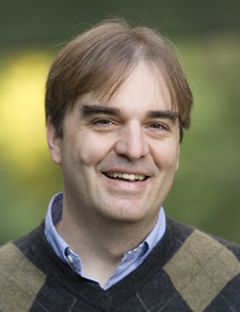
Ernest A. Young
Constitutional scholar Ernest A. Young and political scientist and legal theorist Jack Knight are the latest in a line of strong lateral hires at Duke Law School.
Young, formerly the Charles Alan Wright Chair in Federal Courts Law at the University of Texas at Austin, joined the Duke Law School faculty in January 2008. One of the nation's preeminent scholars on federalism, the constitutional division of powers between the states and the federal government, Young also earned a reputation for teaching excellence and service to students during his eight years on the University of Texas faculty.
Knight, the Sidney W. Souers Professor of Government at Washington University of St. Louis, joined Duke's law and political science faculties this semester. A renowned political scientist and legal theorist, Knight's scholarly work focuses on modern social and political theory, law and legal theory and political economy. He holds appointments in both Duke Law and the Department of Political Science.
"We are delighted to welcome both of these distinguished scholars to Duke," said Dean David F. Levi. "They are scholars and teachers of the highest caliber who will strengthen our standing as one of the strongest and most intellectually diverse public law programs in the country. Their decision to join our faculty adds further momentum to Duke Law's forward progress."
Young and Knight are the latest in a long line of established scholars who have come to Duke Law over the past few years. During the seven-year deanship of Levi's predecessor, Katharine T. Bartlett, Duke hired 10 leading scholars in a wide variety of fields, in addition to hiring a number of junior faculty members.
"It's a privilege to join the Duke Law faculty, which has great traditions of strength across the board and in my areas of interest," Young said. "I've been extremely impressed by the institutional culture that [former] Dean Bartlett has done so much to build here, and I'm excited by the opportunity to work with Dean Levi to build on that foundation."
"I am very excited about the move to Duke," Knight said. "Duke's faculties of law and political science are among the very best in their respective fields. The opportunity to pursue interdisciplinary research on questions of law and the judicial process with members of both faculties was simply too good to pass up."
Young has written extensively on the "Federalist Revival" of the U.S. Supreme Court under the late Chief Justice William H. Rehnquist. He is a frequent commentator on issues of foreign affairs law that relate to the interaction between domestic and international courts and the application of international law by domestic courts.
Young's scholarly interests also include constitutional interpretation, constitutional theory, maritime law and comparative constitutional law.
"Ernie Young's writings about federalism have shaped, and no doubt will continue for many years to shape, scholarly understanding of the most basic constitutional questions about the relationship of nation and state," said Daniel J. Meltzer, vice dean and the Story Professor of Law at Harvard Law School. "Well-known also as a gifted teacher, he would be an outstanding addition to the faculty of any law school."
At the University of Texas at Austin, Young won the Texas Exes Teaching Excellence Award and the Federalist Society's Paul M. Bator Award for excellence in teaching, scholarship, and public service.
In addition to his scholarly work, Young is actively involved in both public and private litigation in his areas of interest. On behalf of leading constitutional and international law scholars, he wrote a brief in Medellin v. Texas, argued in the Supreme Court in the fall, concerning the extent of presidential power over state court proceedings in cases under international treaties.
He also co-wrote a scholars' brief in Gonzales v. Raich, a recent Supreme Court case concerning federal regulation of medical marijuana. He argued a private securities law appeal in the U.S. Court of Appeals for the Seventh Circuit in September.

Jack Knight
Dean David Levi said Knight will further enhance the school's interdisciplinary study of law.
Knight is recognized for research on the problem of the rules and norms that organize human activities in nations. In addition to study of the motivations and decisions of judges, he has examined the effects of the norm of extensive prior judicial experience as a prerequisite for service on the U.S. Supreme Court, as well as several other aspects of how courts make decisions and how judges choose their positions in opinions.
"His work on the strategic behavior of judges and understanding institutions has caused paradigm shifts in the way we understand the relationships between institutions and human behavior," said Professor Mitu Gulati who is an expert in, among other things, judicial behavior.
"It took some time for law professors to apply the work that Jack Knight and others like [Northwestern political science professor] Lee Epstein have done, but now it's almost unacceptable not to take their insights into consideration when studying judicial behavior. It's quite tremendous that he has joined our faculty. Having Jack Knight in our midst is going to improve the work that all of us do at the Law School."
"Studying law requires an understanding of a wide variety of disciplines," Levi said. "Jack Knight brings to our faculty and students a deep and authoritative knowledge of political philosophy, law, and economics that will enhance our curricular offerings and research efforts. His work is path-breaking in many fields, but for scholars of the law, his study of judicial behavior and decision making has been particularly important. We're very excited to welcome him to Duke and to the Law School."